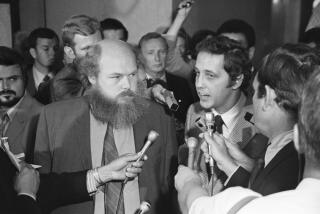The Strange Saga of a Bizarre Billionaire : HOWARD HUGHES: The Untold Story by Peter Harry Brown and Pat H. Broeske; Dutton $24.95, 482 pages
- Share via
Nowadays, a rich man’s son might use his inherited wealth to vainly run for president with a two-word platform (“Flat tax!”). But Howard Hughes, as we are reminded in a plump new biography, spent his millions to acquire and run movie studios, invent and fly cutting-edge experimental aircraft, romance the most celebrated women of his era, and wield his considerable influence in the very highest circles of power.
Entertainment journalists Peter Harry Brown and Pat H. Broeske make good use of long-hidden dossiers and documents that were not available to previous biographers of Hughes, including more than 2,000 FBI files on his glamorous but exceedingly weird love life.
The trove included love letters from Katharine Hepburn, “hundreds of close-up photographs of Jane Russell’s cleavage,” surveillance reports from private eyes whom Hughes paid to follow the starlets he courted, and FBI wiretaps of the billionaire’s “nights of passion” with such luminaries as Lana Turner and Ava Gardner.
That’s not to suggest the book is merely a posthumous kiss-and-tell job, although there is plenty of name-dropping in these pages. The biographers dutifully chronicle the near-mythic saga of Hughes from his birth on Christmas Eve 1905 in a Baptist hospital in Houston (“It was the most difficult birth Dr. Oscar L. Norsworthy had ever witnessed”) to his pitiable death in a private jet en route from Acapulco in 1976.
“The richest man in America,” recalls the doctor who was among the last to see Hughes alive, “ill, starving and neglected as if he were a derelict on the street.”
As the authors point out, the life of Howard Hughes can be seen as the arc of a cruel mental illness, and they give a psychiatric diagnosis to explain the grotesque conduct that Hughes manifested throughout his life--obsessive-compulsive disorder, a condition that helps us understand why he reached so high and fell so low in his tormented life.
At the peaks, Hughes deserved the glittery headlines that attached themselves to him--he was not only rich and handsome, a self-made Hollywood mogul with a string of starlets, but also a gifted, bold and successful entrepreneur, innovator and influence-peddler.
But he faltered, too, whenever his illness cycled sharply downward. And so, for example, even if his pioneering efforts as a test pilot were sometimes touched with madness--the “Spruce Goose” is only the most notorious of his exploits--the authors credit him as an authentic visionary in aviation.
It’s somehow fitting that Hughes, as the authors reveal in fresh detail, was deeply enmeshed in the Watergate scandal. Indeed, they suggest that his name figured prominently in then-President Nixon’s secret tapes, and were carefully excised in that famous “18-minute gap.” The conspiratorial style of the Nixon White House--and Nixon’s own febrile persecution complex--must have seemed profoundly familiar and even attractive to Hughes.
“The twisted, paranoid trail that allowed an incapacitated billionaire to bring down an American president was incredibly complicated,” the authors explain, “hinging upon Nixon’s fear of Hughes . . . the intensification of Howard’s obsessive-compulsive disorder, and the river of drugs Hughes’ doctors and aides had begun pumping into his system. . . .”
After his death, and perhaps against his wishes, the Hughes fortune ended up in a charitable foundation that is “the country’s largest private sponsor of biomedical research.” And yet, during his lifetime, medical science was able to do nothing to temper Hughes’ own psychiatric disorder; on the contrary, it was a ready supply of codeine and Valium that helped to turn Hughes into the celebrated lunatic that he became.
“OCD had not even been diagnosed at that point,” one doctor says. “There was no hope for Howard.”
By the end of his life, the reclusive Hughes was a caricature of himself, but somehow he retained a kind of batty, ironic humor. The authors report that when he came across a newspaper item that referred to him as a “paranoid, deranged millionaire” Hughes exploded.
“I’m a billionaire,” he raved to his loyal retainers.
Hughes comes across as pathetic and pitiable, if not downright tragic, in Brown and Broeske’s new bio. But he is an undeniably fascinating man, and their book is a compelling read. And that’s exactly why yet another biography of Howard Hughes is a vastly more appealing prospect than, say, the memoirs of Steve Forbes.
More to Read
Sign up for our Book Club newsletter
Get the latest news, events and more from the Los Angeles Times Book Club, and help us get L.A. reading and talking.
You may occasionally receive promotional content from the Los Angeles Times.










